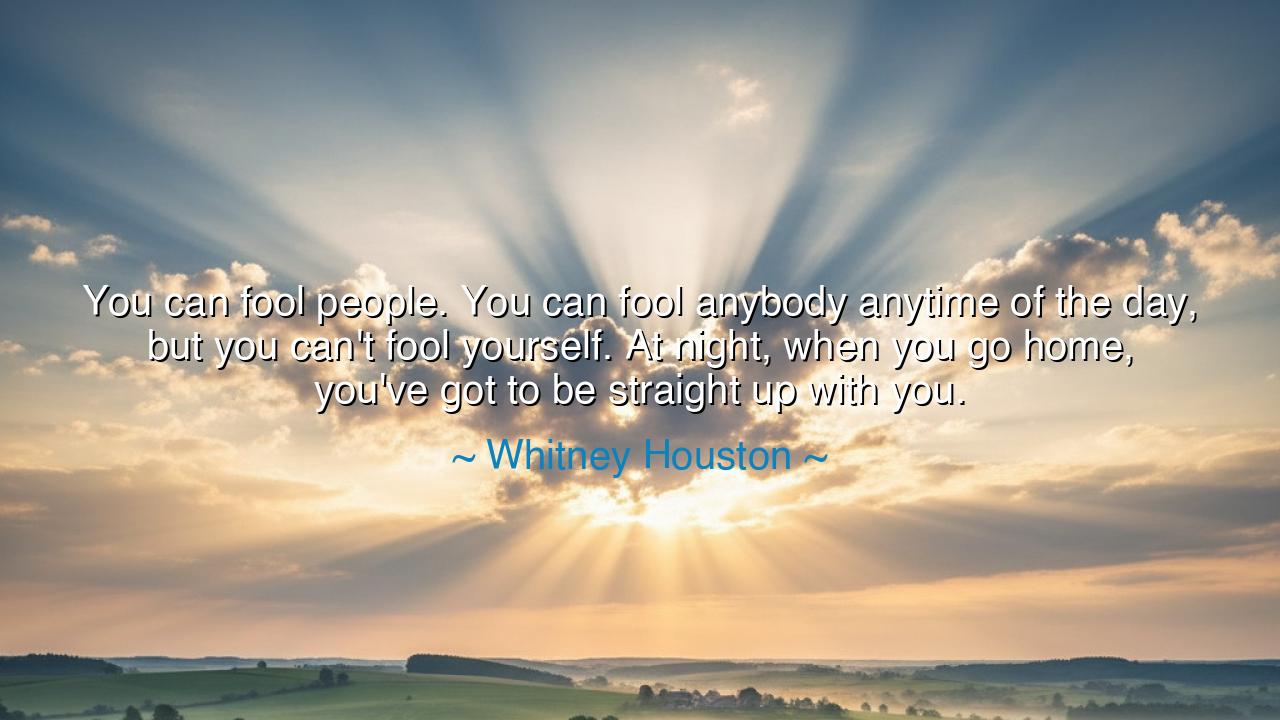
You can fool people. You can fool anybody anytime of the day, but
You can fool people. You can fool anybody anytime of the day, but you can't fool yourself. At night, when you go home, you've got to be straight up with you.






The words of Whitney Houston—“You can fool people. You can fool anybody anytime of the day, but you can't fool yourself. At night, when you go home, you've got to be straight up with you”—are not merely a reflection of personal honesty. They are an echo of the ancient wisdom that has guided humankind since the dawn of self-awareness: the truth that the soul cannot be deceived. While others may be misled by masks, gestures, and words, the heart bears witness to every falsehood we commit against ourselves. In the silence of night, when the clamor of the world fades away, one stands alone before the mirror of one’s own conscience—and there, no disguise holds.
In these words lies the essence of integrity—a sacred flame carried within each of us. To live in truth is to stand unshaken amid the storms of deceit and temptation. Many have risen high in the eyes of others, only to crumble under the weight of their own lies. The ancients spoke of this truth when they said that “a man’s heart is his judge, and his sleep is his trial.” For though the applause of men may fill the day, it is the whisper of conscience that commands the night. And when the night brings silence, only the honest sleep in peace.
Consider the story of Marcus Aurelius, the philosopher-king of Rome. He ruled over vast lands and legions, and yet each evening he withdrew into his chamber and wrote words to himself—not to flatter, not to boast, but to keep his soul awake. In his Meditations, he confessed his weaknesses and reminded himself that glory means nothing if one is untrue within. He knew that self-deception is the most dangerous of all falsehoods, for it corrupts the source of all wisdom—the mind that believes its own lie. Thus, even as an emperor, he lived as a servant to truth.
In our own age, when appearance often reigns above essence, this quote speaks with the force of thunder. It tells us that authenticity is not a performance but a pilgrimage. Many may wear masks of confidence, kindness, or virtue, yet the self—immortal and watchful—sees behind the veil. When we betray it, we suffer an invisible torment: the quiet ache of knowing we are not who we pretend to be. That is why so many who seem to have everything still feel hollow, and so many who live humbly walk in peace.
There is a heroism in facing oneself. To sit in stillness and look at one’s reflection without illusion is a greater battle than any fought with sword or fire. It requires courage to admit one’s faults, strength to accept one’s truth, and grace to begin again. For the path to peace is not paved with denial but with self-honesty—that radiant virtue which frees the spirit from shame. And though the world may mock or misunderstand such transparency, the soul rejoices, for it has nothing left to hide.
In practical life, this teaching calls us to daily self-examination. Before the day ends, sit in quiet and ask: Did I act in truth today? Did I honor the person I claim to be? If not, forgive yourself—but do not lie to yourself. Let honesty become your night’s companion. Write down your truths. Confess your fears. Adjust your path. Like a craftsman shaping marble, carve away pretense until only what is real remains. For only the truthful can rest without fear.
The lesson is clear and eternal: you may deceive the eyes of others, but never the gaze of your own soul. The world may be fooled for a time, but the spirit within keeps its own records. To live rightly is to make peace with that inner witness—to walk each day knowing you owe no apology to your reflection. And when night comes, and all masks fall, the one who has lived truthfully will find not judgment, but peace, in the company of their own heart.






AAdministratorAdministrator
Welcome, honored guests. Please leave a comment, we will respond soon